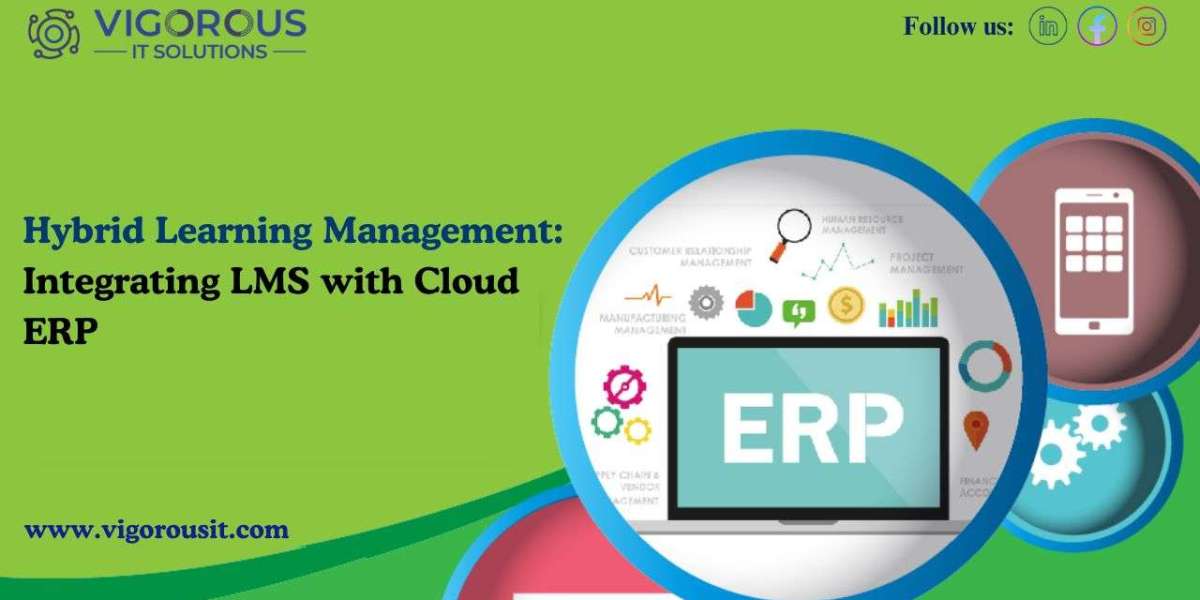Introduction
Hybrid learning—a blend of in-person and online education—has become a cornerstone of modern education. As institutions strive to deliver flexible, scalable, and efficient learning experiences, integrating Learning Management Systems (LMS) with Cloud ERP (Enterprise Resource Planning) platforms has emerged as a game-changer. This synergy streamlines administrative workflows, enhances data accessibility, and empowers educators to focus on student success. For schools, colleges, and universities, this integration is no longer optional—it’s essential for staying competitive in 2025’s evolving educational landscape.
Why Integrate LMS with Cloud ERP?
1. Centralized Data Management
Cloud ERP systems consolidate data from admissions, finance, HR, and student records into a single platform. When integrated with an LMS, institutions gain real-time insights into student performance, attendance, and resource allocation. For example, a dip in attendance flagged by the ERP can trigger automated interventions via the LMS, such as personalized study materials or counselor alerts.
2. Streamlined Administrative Workflows
Manual tasks like course enrollment, fee management, and grade reporting consume valuable time. Integration automates these processes, reducing errors and freeing staff to focus on strategic initiatives.
3. Enhanced Student Experience
Students access everything—course materials, schedules, fee payments, and academic records—from a unified portal. This seamless experience boosts engagement and satisfaction.
4. Scalability for Growth
Cloud-based solutions scale effortlessly as institutions expand, supporting more users and data without costly infrastructure upgrades.
Key Features of an Integrated LMS and Cloud ERP System
1. Unified Student Information System (SIS)
A Cloud ERP for education enables institutions to manage student records, grades, attendance, and learning progress in a single platform.
2. AI-Powered Personalized Learning
An integrated LMS-ERP solution uses AI-driven analytics to offer personalized learning recommendations based on student performance data.
3. Automated Fee & Finance Management
A cloud ERP with LMS integration allows automatic fee calculations, invoicing, and payment tracking, reducing financial discrepancies.
4. Remote Learning & Mobile Accessibility
A mobile-friendly LMS and ERP system enables students and educators to access coursework, assignments, and financial records from anywhere.
5. Real-Time Communication & Collaboration
With in-app messaging, discussion forums, and video conferencing, students and teachers can engage in real-time learning experiences.
Key Benefits of LMS-Cloud ERP Integration
- Real-Time Analytics:
Combine LMS data (course progress, quiz scores) with ERP insights (attendance, financial aid status) to identify at-risk students and tailor support. - Automated Reporting:
Generate compliance-ready reports on accreditation, funding, or student outcomes without manual data entry. - Cost Efficiency:
Reduce IT costs by eliminating siloed systems and leveraging the cloud infrastructure’s pay-as-you-go model. - Improved Collaboration:
Faculty, administrators, and students collaborate efficiently through shared platforms, whether on-campus or remote. - Data security:
cloud ERP systems offer robust encryption and GDPR-compliant data handling, critical for protecting sensitive student information.
Best Practices for Successful Integration
- Choose Interoperable Platforms
Opt for LMS and ERP systems with pre-built integrations or open APIs. Popular pairs include Blackboard Learn with Oracle ERP. - Prioritize Mobile Accessibility
Ensure both systems are mobile-friendly, as 70% of students access content via smartphones. - Start Small
Begin with high-impact modules like attendance or fee management before expanding to full integration. - Leverage AI & Analytics
Use predictive analytics to optimize course schedules or resource allocation based on historical data. - Partner with Experts
Collaborate with IT specialists like Vigorous IT Solutions to navigate technical complexities and ensure a smooth rollout.
Conclusion
Integrating LMS with Cloud ERP is pivotal for institutions aiming to thrive in the hybrid learning era. This synergy enhances operational efficiency, student outcomes, and data security while future-proofing educational strategies.
Vigorous IT Solutions empowers institutions with end-to-end integration services, from API development to GDPR-compliant cloud migration. With expertise in cutting-edge technologies like AI and blockchain, we deliver scalable, secure solutions tailored to your needs.
Ready to transform your institution’s hybrid learning experience? Contact Vigorous IT Solutions today to unlock the full potential of LMS-ERP integration!
Read Also: List Of Top School ERP Software In India


